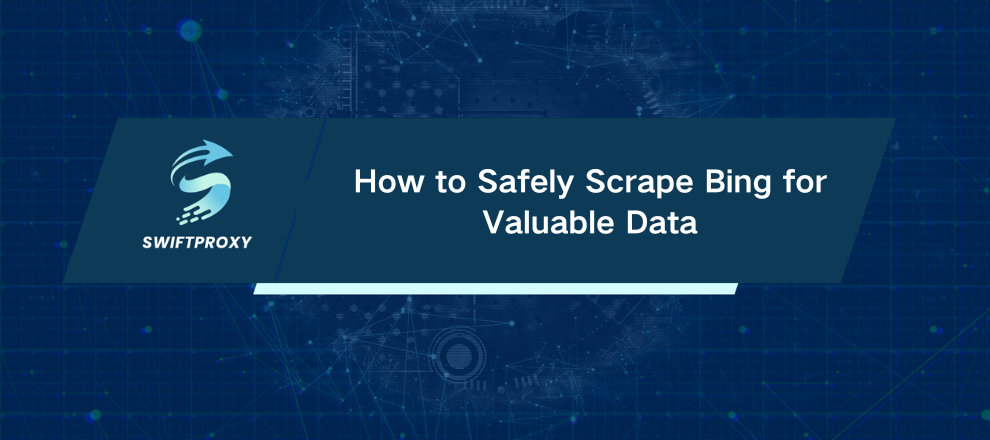How to Safely Scrape Bing for Valuable Data
If you want to understand your competitors, track market trends, or spot SEO opportunities, you’ll need to gather data that’s scattered across search results. Bing holds a treasure trove of information, but the challenge is collecting it safely, efficiently, and legally. Scraping Bing search results can unlock insights that fuel smarter business decisions. But it’s not just about running scripts and gathering URLs. If done recklessly, you risk getting blocked—or worse, running afoul of regulations. Here’s how to scrape Bing like a pro, extract meaningful data, and protect yourself along the way.

What is Bing Really
Bing, Microsoft's search engine launched in 2009, is more than just a Google alternative. It offers web, image, video searches, news, maps, and even rewards for using the platform. Integrated across Microsoft products—from Windows to Edge to Cortana—Bing leverages AI and machine learning to deliver personalized search results that improve over time.
Key features to know:
Web Search: Find websites, news, and articles.
Image Search: Filter, search by similarity, and explore visuals efficiently.
Video Search: Preview videos without leaving the search page.
Maps and Directions: Offers traffic, routes, and 3D imagery.
Rewards Program: Earn points for searches and redeem them for gift cards.
Integration and AI: Personalized results powered by machine learning.
As the world's second-largest search engine, Bing offers a rich dataset for businesses willing to tap into it—legally and strategically.
Why You Should Scrape Bing Search Results
Businesses scrape Bing to:
Analyze Competitors: See what keywords your rivals are targeting and how they structure content.
Conduct Market Research: Track trending topics, products, and services.
Gain SEO Insights: Monitor keyword performance and uncover opportunities.
Understand Ad Strategies: Identify ads running in search results and analyze competitor tactics.
The data collected can inform marketing strategies, optimize campaigns, and give you a competitive edge. But it must be done carefully.
How to Safely Scrape Bing Search Results
Scraping Bing safely requires both technical finesse and ethical awareness. Here's a step-by-step approach:
Step 1: Choose the Right Tool
You can write your own scripts using Python or Node.js, or leverage scraping frameworks:
BeautifulSoup (Python): Extract HTML data with precision.
Scrapy (Python): Handle complex crawling tasks efficiently.
Puppeteer (Node.js): Automate browsing for dynamic content.
Automation saves time—but don't overwhelm Bing's servers. Pace matters.
Step 2: Follow Bing's Robots.txt
Bing's robots.txt file sets the boundaries for scraping. Some pages are off-limits. Respecting these rules prevents legal and ethical violations. Only target pages allowed for crawling, like search results, and avoid internal or admin pages.
Step 3: Prevent Overloading Bing's Servers
Bombarding Bing with requests is a fast way to get blocked. Follow these best practices:
Throttle Requests: Break scraping into smaller chunks.
Use Time Delays: Pause between requests to mimic human behavior.
Rotate IPs: Services like Swiftproxy help rotate IPs to reduce detection risk.
A cautious approach ensures your access remains uninterrupted.
Step 4: Gather and Examine Data
Once scraped, focus on actionable insights:
Search Rankings: Track where your website or competitors rank.
Page Titles and Meta Descriptions: Learn how top performers structure content.
URLs and Backlinks: Identify sources driving traffic to competitors.
Ad Placements: Spot trends in paid search campaigns.
This data directly informs SEO, marketing, and content strategies.
Step 5: Stay Ethical
Scraping is powerful—but ethical boundaries matter:
Limit Frequency: Don't overload servers or disrupt users.
Avoid Personal Data: Never scrape private or sensitive information.
Respect IP and Content Rights: Use data responsibly.
Ethical scraping protects your reputation and keeps your operations compliant.
How Swiftproxy Can Enhance Your Scraping
Swiftproxy is a tool that helps scrape safely and efficiently:
IP Rotation: Over 80 million real home IPs to reduce detection.
Geo-Targeted Proxies: Target specific markets for precise regional insights.
Speed and Reliability: High-speed proxies with up to 99.9% success rates.
Anonymity and Security: Mask your IP to stay private while scraping.
With Swiftproxy, you can scale safely and avoid disruptions in your data collection process.
Conclusion
Scraping Bing search results isn't just about collecting data—it's about gathering insights that drive decisions. Use the right tools, respect ethical guidelines, and protect your operations with proxy services like Swiftproxy.
Do it correctly, and you unlock a steady stream of actionable intelligence that helps your business stay ahead of the competition.

















































